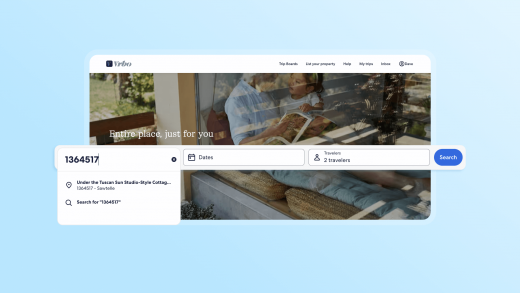The short-term rental market is booming, offering exciting profit opportunities for aspiring entrepreneurs. However, rising property prices make it harder for many people to enter the Airbnb business. This leads to a common question: Is there a way to make money on Airbnb without owning a property? The answer is yes—Airbnb arbitrage.
Airbnb arbitrage can be a smart way to generate income with less upfront capital. However, it’s not without challenges. In this guide, we’ll walk you through everything you need to know about Airbnb arbitrage. You’ll learn how it works, whether it’s right for you, its pros and cons, how to get started, and how to scale it effectively.
Whether you’re managing your own property or building a business through Airbnb arbitrage, Hostex can make operations much easier. It automates over 70% of your daily tasks and helps you manage listings across all platforms. That means more time for what truly matters — and pricing starts at just $4.9/month.

What is Airbnb Arbitrage?
Arbitrage is a well-known business concept. Think of renting a unit in a shopping mall to run your own store. You don’t own the space, but you make money from how you use it. Airbnb arbitrage follows the same idea.
In simple terms, Airbnb arbitrage means renting a property long-term, then re-renting it to short-term guests on platforms like Airbnb. The profit comes from the gap between your monthly rent and the higher income from daily bookings.
This strategy allows you to enter the short-term rental market without owning property. For new hosts or entrepreneurs looking to scale, it’s a more affordable way to start in real estate.
How Much Can You Earn from Airbnb Arbitrage?
There’s no one-size-fits-all answer. Your earnings from Airbnb arbitrage will depend on several factors, including your location, property quality, and how well you manage operations. The outcome can vary significantly from one host to another.
That said, the cost structure of Airbnb arbitrage is relatively straightforward. Your expenses typically include monthly rent, cleaning fees, furniture depreciation, Airbnb service fees, and the cost of tools like property management software.
According to many experienced hosts, a well-managed arbitrage property can earn 2 to 3 times its total monthly cost. With strong occupancy rates and efficient systems in place, the profit potential is considerable.
Here’s a basic example:
You rent a property for $2,000 per month. If you list it on Airbnb at $250 per night, you only need 8 booked nights to cover your rent. Any bookings after that are your profit. At an 80% occupancy rate, you could potentially earn $4,000 in monthly profit.
Of course, this is a simplified example. Real-world operations also include cleaning fees, repairs, and management costs.

Pros and Cons of Airbnb Arbitrage
Like any business model, Airbnb arbitrage comes with its own set of advantages and challenges. Before diving in, it’s important to weigh both sides carefully.
Pros
1. Low startup costs
You don’t need to buy property. This means no large down payments, no mortgages, and no legal fees tied to ownership. You can start with much less capital.
2. Flexibility
You can easily switch properties or expand your business as opportunities arise. This model allows you to test different markets with minimal risk.
3. Full control over profits
Since you’re not partnering with a property owner, you keep all the revenue. What you earn after expenses is entirely yours.
4. Lower responsibility
Because you don’t own the property, you’re usually not responsible for major repairs like roofing or plumbing replacements. That reduces long-term risk.
5. Faster returns
Compared to buying a home, you can start making money much quicker. Once your listing is live and gets booked, you begin generating income right away.
Cons
1. Unstable income
No matter how well your listing performs, you still have to pay rent. If your property doesn’t book enough nights, you may lose money.
2. Legal restrictions
Some cities or buildings have laws that limit or ban subletting. Violating these rules could lead to fines or eviction.
3. Landlord resistance
Not all landlords are open to subleasing, especially for short-term rentals. You’ll need to find a landlord who understands and supports your business.
4. Market saturation
In popular areas, the Airbnb market is often crowded. High competition can lower your nightly rates and cut into your profits.
5. Property damage risk
You’re responsible for the property during your lease. If guests damage anything, you’ll need to handle the repairs and costs.

How to Start Airbnb Arbitrage?
Success in Airbnb arbitrage largely depends on how well you plan and manage the day-to-day operations. Let’s explore some key steps and operational best practices to help you thrive.
1. Identify Your Target Market
Before diving in, understand who you’re trying to attract. Is your property in a tourist hotspot, a business district, or a neighborhood popular with digital nomads?
Knowing your target guests helps you decide what amenities to offer, how to price your listing, and even how to write your descriptions. The more you align with your ideal guest’s expectations, the better your chances of consistent bookings.
2. Secure the Right Lease with Landlord Approval
Traditional leases often forbid subletting, so you’ll need your landlord’s clear permission to operate a short-term rental. Building trust from the beginning is essential—you don’t want surprises down the line.
That means having an honest conversation and presenting a solid plan. Show the landlord how you’ll protect their property, handle guest vetting, and take care of cleaning and maintenance.
3. Develop a Smart Pricing Strategy
Dynamic pricing is crucial in this business. Rates should reflect local demand, seasonality, weekends, holidays, and events. You’ll also want to keep an eye on your competition to stay competitive.
Tools like Airbnb’s Smart Pricing or third-party software like PriceLabs can help you automate pricing while maximizing revenue.
4. Upgrade the Space and Amenities
Think like a guest, not a long-term tenant. What would make someone book your place over others? A clean, comfortable, and well-equipped home is key.
Prioritize items that have the biggest impact—comfy mattresses, fast Wi-Fi, blackout curtains, decent cookware, and good lighting.
You don’t have to break the bank, but a few thoughtful upgrades can go a long way.
5. Optimize Your Listing and Marketing
Once your property is listed on Airbnb, Vrbo, or Booking.com, it’s time to get it noticed.
- Use professional photos and write a clear, engaging description that highlights what makes your place unique.
- Optimize your title and tags with relevant keywords.
- Promote your property on social media.
- Partner with local tourism groups or invite travel influencers to stay and share.
Remember, the more visibility you get, the higher your occupancy rate.
6. Deliver Excellent Guest Service
Happy guests leave 5-star reviews, and those reviews lead to more bookings.
Quick replies, clear instructions, and being available when guests need help can make a big difference. Respond to inquiries promptly, offer easy check-in experiences, and follow up after check-out. Every detail counts.
7. Streamline Daily Operations
Managing multiple listings and daily tasks manually can quickly become overwhelming. That’s where automation tools like Hostex come in.
Hostex helps automate over 70% of your daily work—calendar syncing, pricing updates, guest messaging, review management, cleaning schedules, and more.
With Hostex, you can scale your business efficiently and focus your energy where it matters most.

Common Questions About Airbnb Rental Arbitrage
If you’re considering Airbnb rental arbitrage, you likely have some questions. Let’s walk through a few of the most frequently asked ones, from legal concerns to business growth strategies.
1. Are There Alternatives to Airbnb Arbitrage?
Yes. Rental arbitrage is a powerful strategy, but it’s not the only way to earn from the short-term rental industry, especially if you don’t own property. Here are some great alternatives:
- Short-Term Rental Manager: Oversee Airbnb listings for other hosts.
- Airbnb Co-host: Partner with property owners to handle daily tasks like guest messaging and check-ins.
- Vacation Rental Franchise: Join an established brand and use their systems to run your business.
- Consulting: Offer your expertise to help others launch or optimize their listings.
- Airbnb Experience Host: Create and lead local tours or activities through Airbnb.
- Cleaning Services: Provide reliable turnover cleaning for short-term rentals.
- Vacation Rental Photographer: Help listings stand out with professional photography.
- Marketing Support: Assist hosts with SEO, ads, and listing optimization.
We explored these roles in detail in our guide: How to Earn Money on Airbnb Without Owning Property
2. Is Airbnb Arbitrage Legal?
It depends on where you operate. Laws around short-term rentals and subleasing vary by country, state, city, and even neighborhood.
In many major cities, short-term rental rules are evolving rapidly. You’ll need to check:
- Whether your target city allows short-term rentals like Airbnb.
- Whether there are limits on how many nights per year you can host.
- If a business or rental license is required to operate legally.
You should also confirm your lease allows subletting. Some landlords explicitly prohibit rental arbitrage, while others may allow it under certain conditions. Always get permission before launching a listing to avoid eviction risks.
Consult local regulations or speak to a legal expert to understand your obligations and ensure your business is compliant.
3. What Are the Costs of Airbnb Arbitrage?
While Airbnb arbitrage doesn’t require buying property, there are still upfront and ongoing costs to consider. These may include:
- Application fees and deposits (first month, last month, security deposit)
- Rental insurance
- Legal and licensing costs
- Furniture and décor
- Utilities and Wi-Fi setup
- Entertainment subscriptions (like Netflix)
- Cleaning services
- Toiletries and kitchen essentials
- Maintenance and repairs
- Property management tools
Before signing a lease, simulate different financial scenarios. Ask yourself:
- What happens if occupancy is 10% lower than expected for six months?
- What if cleaning costs or utility bills are 20% higher than planned?
- Preparing for these variables will help you build a more resilient business.
4. What If the Landlord Doesn’t Agree to Airbnb Arbitrage?
Convincing a landlord can be challenging, but not impossible. Focus on building trust.
First, reassure them that you’ll care for the property like it’s your own. Rental arbitrage hosts depend on 5-star reviews, so it’s in your best interest to keep the place spotless and damage-free, possibly better maintained than a regular long-term rental.
Second, highlight the stability you offer. They get guaranteed monthly rent without having to chase payments or manage tenant issues.
Make it a win-win: you run a responsible, profitable business, and they enjoy stress-free income.
5. How Do I Scale My Rental Arbitrage Business?
Once your first unit is running smoothly, scaling becomes the next logical step. The beauty of Airbnb arbitrage is that the model is highly repeatable if you have solid systems in place.
Here’s how to grow smart:
- Automate your operations: Use tools like Hostex to handle guest communication, calendar syncing, turnover scheduling, and more.
- Outsource key tasks: Cleaning, maintenance, and guest support can be delegated to trusted partners, freeing you up to focus on growth.
- Diversify your locations: Don’t put all your units in one city. Spreading out across different markets can reduce risk and increase earning potential.
Scaling isn’t just about more listings—it’s about sustainable systems that let you grow without burning out.

Final Thoughts
Airbnb rental arbitrage isn’t just a clever side hustle, it’s a business model that rewards preparation, consistency, and smart decision-making. While it doesn’t require property ownership, it does demand responsibility. You’re stepping into a space where guest expectations are high and market conditions can shift quickly.
Before diving in, take the time to research, plan, and build the right systems. Surround yourself with tools and partners that support long-term growth, not just quick wins. If done right, rental arbitrage can open the door to financial freedom, professional growth, and a flexible lifestyle on your own terms.
Success won’t happen overnight, but for those willing to approach it like a real business, the payoff can be more than just profit. It can be freedom.




useful